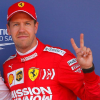If we forget about qualifying for the moment and think about the sport itself.
A big problem F1 is facing is that people do not really care. With Schumi and smart marketing by Bernie, F1 grew enourmously during the nineties. The fact that Schumi went to Ferrari to "bring them back to the top" was a great material for any PR guy. It was a bit "David against Goliat" were Ferrari was David and "Goliat" was the evil British empire. That also stirred up interest in UK, since they in a way were under attack. David eventually won and turned into Goliat II and many of them who started watching in the mid nineties went on to other things. The fight was over. There was no new David, just some weak attempts by Goliat I to stand up again. Schumi went on winning and winning and winning. Seven titles. Seven times World Champion of motorracing. That is a huge achievement, the best in the history of motorsport. On his way there he beat almost all the records available and it is very unlikely that anyone will even come close to his records.
Was he worth it? Many says yes, but many says NO. No doubt he was a great driver and all that, but was he really THAT good?
"Michael Shumacher - World Motorracing World Champion 2002!"How many of you thought "wow, he was great" and how many thought "my granny could have won the title in that car"?
Kimi Raikkonen and Fernando Alonso are propably the two biggest talents so far this decade. What would have happened if they both made a debut at Minardi? Would Ron and Flavio have recognized their talent and brought them to the "real" F1? Or would we have thought "Minardi is quite good this year, only 2 seconds off pace"? How would they have reacted by being team mates, knowing that their career depended on winning that internal struggle? It is likely that they would have charged a bit extra, taken a bit more risks, had a few more accidents... The Minardi would still have been last but now the two drivers would not look so good anymore, accident prone as they are.
Top Team problem #1 "The cream always float to the top". Yes, that is true, normally, but apart from the example I gave above - what is "the top"? Kimi thought for sure that he had floated to the top when he signed for McLaren. He was wrong.
Top Team problem #2 A team is good. It attracts sponsors, top staff and top drivers.
It stays good
Top Team problem #3 A team is not so good. It attracts no one, have to pay for everything.
It stays bad.
Apart for the tifosi, do a fan in general follow a driver or a team? I think that those who follow a team are finding it increasingky diffucult to do so, except the tifosi of course. McLaren is Ron and Mercedes. What happens when Ron has enough and says "**** all"? Williams have had a long slump and are propably not winning many new fans and the loyal fans they have must look for a secondary team to cheer for. Or just someone to cheer against.
Honda, Toyota, BMW and Mercedes are to corporate for many. Or am I wrong? Do all the Toyota owners cheer for Toyota? I don't, so it has to be everyone but me in that case.
Back to the drivers and my original idea (who is really intended as a "food for thought" topic). I thougt about it some more during breakfast. What if it became true?
First of all, driver talent would be much more obvious. The audience could see the drivers themselves compete and not only the cars. Had this been during Schumis career and he would still have the number of pole positions that he have, NOBODY would have doubted his greatness.
Second, a team that has the great driver that stands on pole every second race will be attractive to sponsors. They would get more money and better possibility to improve. A solid contract with Alonso driver could possible have made Minardi a top team (unless he had been paired wit Kimi ;) ).
Third. Since the actual skill of a driver becomes important, a small team would ask a driver "Now, how fast can you go?" rather than "How much can you bring".
I have more, but now I must eat























